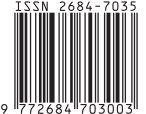PATHOGENESIS OF ORAL CANCER
Abstract
The purposes of this study are to study the pathogenesis of oral cancer and to see the role play of oncogenes, onco-suppressor genes in cancer growth and their mutation type. There are many predisposing factors which may influence the development of cancer. The factors are divided intrinsic (hereditary) and extrinsic factors (bacteria, viruses, fungi, chemical, drugs, radiation, trauma, heat, cold and nutrition). These agents may act individually, in combination with other carcinogen (co-carcinogen) or in combination with other agents that do not in themselves causes cancer (promoters), but that help the carcinogens to mutate or depress cells, but in the mechanism still enigma. Oncogenes onco-suppressor genes are normal genes in human. Oncogenes functions are as growth factor (e.g. sis), growth factor receptor (e.g. erbB1), signal transducer (e.g. ras) or nuclear factor (e.g. myc, jun). Tumor (oral cancer) will be arises if oncogenes and onco-suppressor genes function are disturbed by some carcinogen and these genes have mutation, deletion, amplification or translocation. That was also related to the loss or inactivation of onco-suppressor genes such as p53, so that causes the loss of the normal growth regulation/strait control that associated with tumorigenesis.
Â
Keywords: oncogenes, onco-suppressor genes, pathogenesis, carcinoma




